中国的律师制度(英)
中英律师制度比较
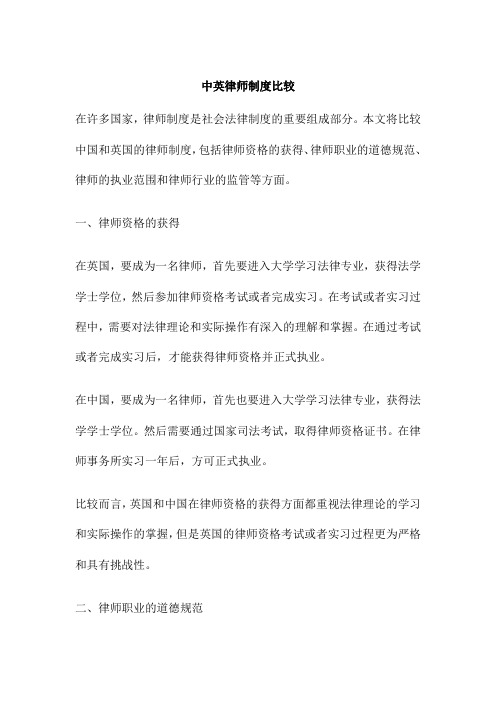
中英律师制度比较在许多国家,律师制度是社会法律制度的重要组成部分。
本文将比较中国和英国的律师制度,包括律师资格的获得、律师职业的道德规范、律师的执业范围和律师行业的监管等方面。
一、律师资格的获得在英国,要成为一名律师,首先要进入大学学习法律专业,获得法学学士学位,然后参加律师资格考试或者完成实习。
在考试或者实习过程中,需要对法律理论和实际操作有深入的理解和掌握。
在通过考试或者完成实习后,才能获得律师资格并正式执业。
在中国,要成为一名律师,首先也要进入大学学习法律专业,获得法学学士学位。
然后需要通过国家司法考试,取得律师资格证书。
在律师事务所实习一年后,方可正式执业。
比较而言,英国和中国在律师资格的获得方面都重视法律理论的学习和实际操作的掌握,但是英国的律师资格考试或者实习过程更为严格和具有挑战性。
二、律师职业的道德规范在英国,律师职业的道德规范非常严格。
律师需要保持独立、公正和诚信,对客户和法庭都要尽职尽责。
如果律师违反道德规范,可能会受到惩戒或者被吊销执照。
在中国,律师职业道德规范也明确规定,律师需要坚持诚信、公正、敬业的原则,严格遵守职业道德和执业纪律。
如果违反职业道德规范,也会受到相应的惩处。
在这方面,中英两国的律师职业的道德规范都强调了诚信、公正和敬业的原则,只是具体的规定可能因为不同的法律体系和文化背景而有所不同。
三、律师的执业范围在英国,律师的执业范围非常广泛,包括民事、刑事、商业、行政等方面。
律师需要为客户提供个性化的法律服务,帮助他们解决各种法律问题。
在中国,律师的业务范围也十分广泛,不仅包括民事、刑事、商业等方面,还包括为政府和企业提供法律咨询和服务。
中国律师的专业化程度也在逐步提高。
总的来说,中英两国的律师执业范围都越来越广泛,为客户提供全方位的法律服务。
四、律师行业的监管在英国,律师行业受到皇家律师协会的监管。
皇家律师协会是一个独立的机构,负责监管律师的执业行为、制定职业道德规范和标准。
中国的法律援助制度(英)

中国的法律援助制度(英)Legal AssistanceLegal assistance is a system of legal remedy adopted by many countries in the world. Under this system, the state, throughout the legal process and at all levels, provides legal assistance, through reduction or exemption of fees, to the underprivileged of society who have difficulty safeguarding their own rights through the normal legal means, because of economic problems or otherwise. As a major safeguard to realize social justice and judicial parity and to protect civil rights, legal assistance occupies a very important position in a country's judicial system.Article 34 of the revised Criminal Procedure Lawof the People's Republic of China, passed on March 17, xx, states, "For public-prosecuted cases, the court can designate a lawyer who provides legal assistance to defend the accused if the accused fails to appoint a defense attorney for economic or otherreasons. If the accused fail to appoint a defender because they are blind, deaf, mute or a minor, the court should designate a lawyer who provides legal aid to defend the accused. If the accused receives a death penalty, but fails to appoint a defense attorney, the court should designate a lawyer who provides legal aid to defend the accused." This is the first time in the history of Chinese legislation that legal assistance was written into law.The Lawyers Law, passed on May 15, xx, provides more specifics with regard to legal assistance. Chapter 6 of the law says, "Citizens who need legal assistance but cannot afford to pay for lawyers' fees, may, in accordance with state regulations, seek legal assistance in matters such as supporting the elderly, workplace injuries, criminal lawsuits, state compensation, and the granting of pensions for the disabled or survivors of an accident. Lawyers should assume the responsibility of legal assistance and dutifully help those in need in accordance with State regulations. Specific rules for legal assistance willbe worked out by the State Council judicial administration and submitted to the State Council for approval." These provisions define the scope of legal assistance and require lawyers to provide legal assistance. In addition, they lay the foundation for future legislation on legal aid.At present, China has formed a four-tier legal assistance structure:1. At the national level, a Center for Legal Assistance has been created under the Ministry of Justice to supervise and coordinate legal assistance across the country. This center, created on May 26, xx, is responsible for supervising legal assistance, drafting regulations and rules, mapping out medium- to long-term plans and annual plans, coordinate legal assistance work nationwide, and conducting exchanges with foreign legal-aid groups and individuals.On the same day, the China Legal Aid Foundationwas created to raise, manage and use the funds, publicize the legal aid system, and promote judicial justice. Funding comes from donations and sponsorshipsgiven by domestic organizations, enterprises and individuals; interest; proceeds from bond and stock trading.2. Legal-aid centers have also been established in provinces (autonomous regions) to supervise and coordinate legal-aid work in their respective jurisdiction.3. The next tier is prefectures and cities where the legal-aid centers perform a dual duty: administer and implement legal-aid programs in their jurisdiction.4. Finally, where conditions permit, legal-aid centers are also set up in counties and districts; where conditions do not permit, the Judicial Bureau of the counties and districts should be responsible for legal aid.Applicants for legal aid should meet two conditions: that have sufficient reason to prove they need legal assistance to safeguard their lawful rights and interests; and that they indeed cannot afford to pay, in part or full, the legal fees.Legal assistance is rendered by three groups of people: lawyers, public notaries and grassroots legal professionals. Lawyers provide procedural aid (including defense for criminal cases, representation for criminal cases, and representation for civil procedures) and non-procedural aid; public notaries provide notarization assistance; grassroots legal professionals provide legal counseling, document drafting and general non-procedural aid.In China, legal aid is funded by three sources: government, social donations and volunteering. Though still in an embryonic stage, China's legal-aid system as a major legal institution will surely play an important role in realizing the rule of law in China, safeguarding fundamental human rights and promoting social stability.。
中国的律师制度
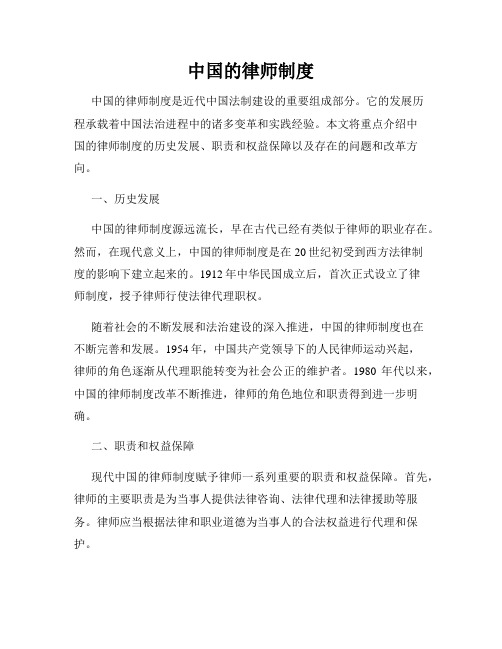
中国的律师制度中国的律师制度是近代中国法制建设的重要组成部分。
它的发展历程承载着中国法治进程中的诸多变革和实践经验。
本文将重点介绍中国的律师制度的历史发展、职责和权益保障以及存在的问题和改革方向。
一、历史发展中国的律师制度源远流长,早在古代已经有类似于律师的职业存在。
然而,在现代意义上,中国的律师制度是在20世纪初受到西方法律制度的影响下建立起来的。
1912年中华民国成立后,首次正式设立了律师制度,授予律师行使法律代理职权。
随着社会的不断发展和法治建设的深入推进,中国的律师制度也在不断完善和发展。
1954年,中国共产党领导下的人民律师运动兴起,律师的角色逐渐从代理职能转变为社会公正的维护者。
1980年代以来,中国的律师制度改革不断推进,律师的角色地位和职责得到进一步明确。
二、职责和权益保障现代中国的律师制度赋予律师一系列重要的职责和权益保障。
首先,律师的主要职责是为当事人提供法律咨询、法律代理和法律援助等服务。
律师应当根据法律和职业道德为当事人的合法权益进行代理和保护。
其次,律师还承担着维护社会公正和法治的责任。
中国的律师制度强调律师应当依法履行职责,捍卫公正和正义。
律师作为法律的执行者,应当秉持正直、公正和诚信的原则,履行自己的职业道德。
此外,中国的律师制度也为律师的权益保障提供了一定的保障措施。
律师具有言论自由的权利,可以就法律、社会公正等问题发表意见。
律师也享有依法执业的自由,法律规定了律师执业必须具备的条件和程序。
三、存在的问题和改革方向尽管中国的律师制度取得了一定的发展和进步,但仍然存在一些问题和挑战。
首先,一些地方政府和行政机关对律师的干预和限制依然存在。
有时候,律师代理案件受到不合理的阻挠,法律援助工作受到限制,甚至还有一些律师被迫放弃或撤诉。
其次,律师的职业发展和权益保障还需要进一步完善。
律师事务所的经营自主权受到限制,律师的收入和职业发展空间有限,律师的权益保障体系也还不完善。
中西律师制度比较研究
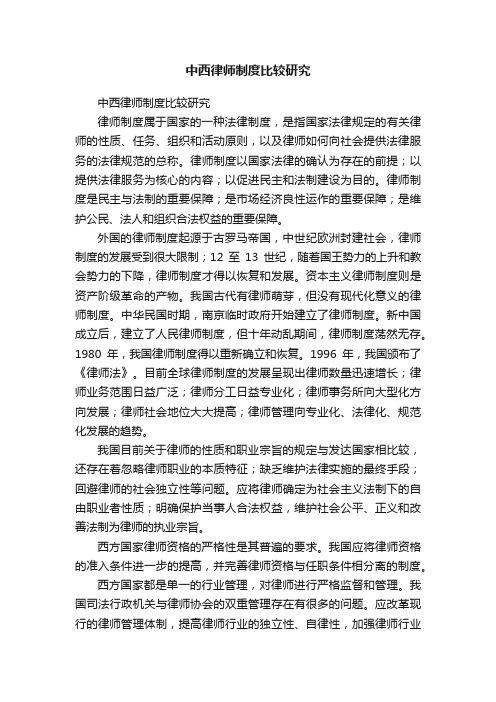
中西律师制度比较研究中西律师制度比较研究律师制度属于国家的一种法律制度,是指国家法律规定的有关律师的性质、任务、组织和活动原则,以及律师如何向社会提供法律服务的法律规范的总称。
律师制度以国家法律的确认为存在的前提;以提供法律服务为核心的内容;以促进民主和法制建设为目的。
律师制度是民主与法制的重要保障;是市场经济良性运作的重要保障;是维护公民、法人和组织合法权益的重要保障。
外国的律师制度起源于古罗马帝国,中世纪欧洲封建社会,律师制度的发展受到很大限制;12至13世纪,随着国王势力的上升和教会势力的下降,律师制度才得以恢复和发展。
资本主义律师制度则是资产阶级革命的产物。
我国古代有律师萌芽,但没有现代化意义的律师制度。
中华民国时期,南京临时政府开始建立了律师制度。
新中国成立后,建立了人民律师制度,但十年动乱期间,律师制度荡然无存。
1980年,我国律师制度得以重新确立和恢复。
1996年,我国颁布了《律师法》。
目前全球律师制度的发展呈现出律师数量迅速增长;律师业务范围日益广泛;律师分工日益专业化;律师事务所向大型化方向发展;律师社会地位大大提高;律师管理向专业化、法律化、规范化发展的趋势。
我国目前关于律师的性质和职业宗旨的规定与发达国家相比较,还存在着忽略律师职业的本质特征;缺乏维护法律实施的最终手段;回避律师的社会独立性等问题。
应将律师确定为社会主义法制下的自由职业者性质;明确保护当事人合法权益,维护社会公平、正义和改善法制为律师的执业宗旨。
西方国家律师资格的严格性是其普遍的要求。
我国应将律师资格的准入条件进一步的提高,并完善律师资格与任职条件相分离的制度。
西方国家都是单一的行业管理,对律师进行严格监督和管理。
我国司法行政机关与律师协会的双重管理存在有很多的问题。
应改革现行的律师管理体制,提高律师行业的独立性、自律性,加强律师行业的管理。
与西方国家相比较,我国存在着律师的权利与义务不对等;强调义务而权利保障力度不够的问题。
中国的律师制度文档2篇

中国的律师制度文档2篇China's lawyer system documents编订:JinTai College中国的律师制度文档2篇小泰温馨提示:规章制度是指用人单位制定的组织劳动过程和进行劳动管理的规则和制度的总和。
本文档根据规则制度书写要求展开说明,具有实践指导意义,便于学习和使用,本文下载后内容可随意修改调整修改及打印。
本文简要目录如下:【下载该文档后使用Word打开,按住键盘Ctrl键且鼠标单击目录内容即可跳转到对应篇章】1、篇章1:中国的律师制度文档2、篇章2:律师事务所合伙人会议制度文档篇章1:中国的律师制度文档你了解中国的律师制度吗,小泰为大家搜集了一篇“中国的律师制度”,供大家参考借鉴,希望可以帮助到有需要的朋友!律师制度,是指国家法律规定的有关律师的性质、任务、组织和活动原则,以及律师如何向社会提供法律服务的法律规范的总称。
(一)律师的性质、任务和地位我国1996年5月15日颁布的《中华人民共和国律师法》第二条规定,"本法所称的律师,是指依法取得律师执业证书,为社会提供法律服务的执业人员。
"我国的律师是我国社会主义法制建设中不可缺少的一支重要力量。
《律师法》第三条规定,"律师执业必须遵守宪法和法律,恪守律师职业道德和执业纪律。
律师执业必须以事实为依据,以法律为准绳。
"律师的任务是指由国家法律明确规定的,通过律师的执业活动所要实现的目的。
根据《律师法》第一条的规定,维护当事人的合法权益,维护法律的正确实施就是律师的任务。
律师任务的这两个方面是相辅相成的,密切联系辩证统一的关系,这是由维护当事人的合法权益与维护法律的正确实施之间的一致性所决定的。
律师的地位是指律师在社会生活中和诉讼过程中,所应有的地位和享有的权利,以及所起的作用。
我国的律师在诉讼中处于一种独立的诉讼地位。
律师既不从属于人民法院和人民检察院也不完全从属于当事人,律师参与诉讼维护当事人的合法权益,处于一种独立的诉讼参与人的地位。
中国的法律援助制度(英).doc

中国的法律援助制度(英)Legal AssistanceLegal assistance is a system of legal remedy adopted by many countries in the world. Under this system, the state, throughout the legal process and at all levels, provides legal assistance, through reduction or exemption of fees, to the underprivileged of society who have difficulty safeguarding their own rights through the normal legal means, because of economic problems or otherwise. As a major safeguard to realize social justice and judicial parity and to protect civil rights, legal assistance occupies a very important position in a country’s judicial system.Article 34 of the revised Criminal Procedure Law of the People’s Republic of China, passed on March 17, 1996, states, “For public-prosecuted cases, the court can designate a lawyer who provides legal assistance to defend the accused if the accused fails to appoint a defense attorney for economic or other reasons. If the accused fail to appoint a defender because they are blind, deaf, mute or a minor, the court should designate a lawyer who provides legal aid to defend the accused. If the accused receives a death penalty, but fails to appoint a defense attorney, the court should designate a lawyer who provides legal aid to defend the accused.” This is the first time in the history of Chinese legislation that legal assistancewas written into law.The Lawyers Law, passed on May 15, 1996, provides more specifics with regard to legal assistance. Chapter 6 of the law says, “Citizens who need legal assistance but cannot afford to pay for lawyers’ fees, may, in accordance with state regulations, seek legal assistance in matters such as supporting the elderly, workplace injuries, criminal lawsuits, state compensation, and the granting of pensions for the disabled or survivors of an accident. Lawyers should assume the responsibility of legal assistance and dutifully help those in need in accordance with State regulations. Specific rules for legal assistance will be worked out by the State Council judicial administration and submitted to the State Council for approval.” These provisions define the scope of legal assistance and require lawyers to provide legal assistance. In addition, they lay the foundation for future legislation on legal aid.At present, China has formed a four-tier legal assistance structure:1. At the national level, a Center for Legal Assistance has been created under the Ministry of Justice to supervise and coordinate legal assistance across the country. This center, created on May 26, 1997, is responsible for supervising legal assistance, drafting regulations and rules, mapping out medium- to long-term plans andannual plans, coordinate legal assistance work nationwide, and conducting exchanges with foreign legal-aid groups and individuals.On the same day, the China Legal Aid Foundation was created to raise, manage and use the funds, publicize the legal aid system, and promote judicial justice. Funding comes from donations and sponsorships given by domestic organizations, enterprises and individuals; interest; proceeds from bond and stock trading.2. Legal-aid centers have also been established in provinces (autonomous regions)to supervise and coordinate legal-aid work in their respective jurisdiction.3. The next tier is prefectures and cities where the legal-aid centers perform a dual duty: administer and implement legal-aid programs in their jurisdiction.4. Finally, where conditions permit, legal-aid centers are also set up in counties and districts; where conditions do not permit, the Judicial Bureau of the counties and districts should be responsible for legal aid.Applicants for legal aid should meet two conditions: that have sufficient reason to prove they need legal assistance to safeguard their lawful rights and interests; and that they indeed cannot afford to pay, in part or full, the legal fees.Legal assistance is rendered by three groups of people: lawyers,public notaries and grassroots legal professionals. Lawyers provide procedural aid (including defense for criminal cases, representation for criminal cases, and representation for civil procedures)and non-procedural aid; public notaries provide notarization assistance; grassroots legal professionals provide legal counseling, document drafting and general non-procedural aid.In China, legal aid is funded by three sources: government, social donations and volunteering. Though still in an embryonic stage, China’s legal-aid system as a major legal institution will surely play an important role in realizing the rule of law in China, safeguarding fundamental human rights and promoting social stability.。
中英律师制度比较

中英律师制度比较[摘要]文章试从中英两国律师资格的取得、律师分类及业务范围、律师的管理体制方面进行比较,在此基础上探讨对我国现实律师制度的改革。
[关键词]中国;英国;律师制度1873年英国的司法制度改革《法院法》颁布,英国律师总体分为两种:SOLICITOR和BARRISTER,形成一种独特的二元律师制度。
中国的律师制度经历了漫长曲折的过程于1954年在《宪法》中提出,但中国律师制度的正式形成是1996年第八届全国人大常委会通过的《律师法》。
职业资格的取得英国分为出庭律师和事务律师。
出庭律师的取得条件:首先,年龄在25岁以上,受过高等教育;对于没有获得法律专业学士学位的考生要通过基础法学阶段的考试,有良好的品格证明书,在四大律师学院中的任何一所学习满三年且考试合格,在有经验的出庭律师指导下实习一年,签署入会誓言,才会被授予出庭律师的资格。
事务律师资格取得的条件:法律专业毕业的学生,在学校的三年学习,再加上一年的实践课程,与律师事务所签订实习合同,在律师事务所进行二年实习,完成律师协会规定的所有培训与考核,成为律师协会登记在册的律师,但对于非法律专业学生还要再多用上一年的法律实践课程。
我国的律师资格取得条件:首先,拥护宪法,有行为能力,没有受到过刑事处罚;其次,具有高等院校法律专业本科以上学历,或者高等院校其他专业本科以上学历具有法律专业知识的人员,经国家司法考试合格的,在律师事务所实习一年的可获得律师资格。
与英国律师资格的取得相比我国的律师资格取得相对简单,我国的律师职业资格的取得只是对意志力的考验,考试通过即可。
法律工作者必须有较高的职业素养,需具备一定的逻辑能力、分析问题和解决问题的能力,而仅仅通过一次考试就来评判是否取得律师资格似乎不能体现法律从业者的综合能力。
我们可以借鉴英国的机制,先从考生资格上加以限制,要求具有法学本科以上学历,对不具有法学本科以上学历的应进入国家指定的专业学校进修,提高法学理论素养,提升综合能力,另外还必须在优秀的律师带领下实习一段时间后以确定是否取得律师职业资格。
中国的司法行政管理制度(英)

中国的司法行政管理制度(英)System for Judicial AdministrationThe judicial administration is an important component of the state apparatus and a majorfunctional department of the government. It is responsible for administering judicial execution and managing laws and regulations.Organizationally, the Ministry of Justice supervises all the judicial departments across the country; local judicial authorities are subordinate to superior judicial authorities and to the government at the same level.Main responsibilities of judicial authorities include:1. Manage Reform-through-labor and Reeducation-through-labor InstitutionsOrganize and lead reform-through-labor and reeducation-through-labor work;Set the location of jails and reformatories and placement of prisoners and inmates;Direct, supervise and inspect prisons and reformatories and accurately implement policies and guidelines for reform- and re-education-through-labor work;Propose or review decisions concerning reform- or re-education-through-labor;Draft and review long-term plans and annual plans;Direct jails and reformatories to improve management;Sum up and promote advanced practices in reform- and re-education-through-labor;Inspect and handle major incidents that take place at jails or reformatories;Mete out disciplinary penalties for wardens who violate laws or discipline;Manage, inspect, train and promote officers atjails and reformatories.2. Regulate LawyersSupervise and direct lawyers, law firms and bar associations;Review constitutions of bar associations;Handle applications for taking part in lawyers qualification examination and administer the examination;Confer lawyer's qualifications and licenses;Determine the setup of law firms and the development of lawyers;Draft rules for legal assistance;Penalize lawyers who breach professional discipline, including revoking qualifications of those who are seriously incompetent;Develop rules for lawyers to charge fees;Sum up and promote good practices of lawyers;Draft development plans for the legal profession.3. Regulate Public NotariesSupervise public notaries;Determine the setup of public notary offices, the staffing, organization and examination of public notaries;Appoint and remove the director and deputydirector of public notary offices;Supervise fee-charging and expenditures by public notaries;Perform disciplinary inspections of public notaries;Sum up and promote good practices of public notaries.4. Manage Training of Judicial OfficialsDraft guidelines for training judicial officials and develop training plans;Direct the operation of political and law schools, including training of faculty and developing of textbooks;Sum up and promote good practices in training.5. Manage Legal EducationSet the direction of legal education, draft development plans, coordinate legal education nationwide, and collaborate with the Ministry of Education in supervising legal education across the country;Appoint and remove leading officials of political and law schools affiliated with the Ministry of Justice, review and approve capital expenditures and major expenditures of those schools, determine the setup of programs, enrolment and placement of graduates;Take the lead in developing textbooks for legal education across the country.6. Direct People's Mediation CommitteesManage the organizational, ideological and operational buildup of People's Mediation Committees and direct them in their mediation work;Study causes, characteristics and patterns ofcivil disputes and propose ways to prevent such disputes;Publicize policies, laws and ethics;Sum up and promote good practices in mediation.7. Promote Public Awareness of Rule of LawThis includes collaboration with relevant departments in launching publicity campaigns,introducing legal courses into schools and publishing legal periodicals and books.8. Supervise Foreign Affairs of Judicial Departments.The Ministry of Justice supervises all foreign affairs of the country's judicial organs. This entails determination of direction, scope and forms of foreign affairs and logistical arrangements; sending delegations to visit abroad and attend international conferences; receiving foreign visitors and briefing them on China's legal developments; conducting international legal assistance.9. Supervise Theory-building and Research in Judicial AdministrationDefine the organizational setup and missions of research institutions in the judicial apparatus;Draft laws, regulations and rules concerning judicial administration;Study issues related to judicial administration, crimes (particularly juvenile delinquency).。
(原创)中国律师制度及历史沿革

(三)中国律师制度及历史沿革律师制度作为西方法律制度的重要组成部分,在中国法律近现代化过程中被引进,经过百年洗礼,已经成为了具有中国特色的律师制度。
做为执业律师,应当对中国律师制度的起源有基本的认识和了解,如果一个执业律师对自己所从事的律师职业是一个什么样的制度,具有什么样的发展历史都不够了解,那就很难掌握这个制度的内涵。
中国律师制度是清末变法改制效仿西方典章制度的产物中国律师制度是清末变法改制效仿西方法律制度的产物,当时统治者推行法律改良的直接动因是为了消除列强在中国的治外法权以重整治权。
从大量的资料显示,清末我国律师业得到了较大的发展,律师制度的建立也正式列入立法议程。
民国时期是中国律师制度建立、发展的重要时期。
以孙中山为代表的资产阶级革命派在废除封建专制制度、打碎旧的国家机器的基础上,仿效西方资本主义国家,建立了民主共和政体性质的国家政治制度。
同时,也仿照西方国家的法治原则,确定了全面建立新型法律制度的蓝图。
其中包括改革司法审判体制,建立律师辩护制度。
外国律师的进入刺激了中国律师业的产生在清朝时期,外国律师的进入刺激了中国律师业的产生,拉开了中国引入现代律师制度的序幕。
这一过程最初是从租界开始的。
1843年上海开埠,标志着中国近代租界史的开端。
1845年,英国首任驻沪领事巴尔福依据《中英南京条约》,胁迫上海道台宫慕久签订了《上海土地章程》,在华设立了第一个租界。
随后英、美等国殖民主义者在租界内逐步建立几乎具有国家机器全部职能的统治机构,甚至还设有监狱、法院。
法院建立后采用租界国的审判方式审理案件,这为外国律师进入租界创造了条件,外国律师也因此进入了中国。
外国律师通过租界进入所在城市其他地区,其影响的扩大则是借助“会审公廨”。
会审公廨形式上是租界内由中外双方共同管理的领事法庭(实际完全由租界国管理),其前身是1864年设立的“洋泾浜北首理事衙门”。
起初它只审理发生在租界内的本国侨民的民刑事案件,后来发展为对发生在租界内的他国侨民和中国公民的案件也享有管辖权,也就是先是对属人管辖,后来发展为属地管辖。
律师制度1

• 而《司法考试办法》中关于报名条件规定的是 • 第四章 报名条件 • 第十三条 符合以下条件的人员,可以报名参加国家司 符合以下条件的人员, 法考试: 法考试: • 具有中华人民共和国国籍; (一)具有中华人民共和国国籍; • 拥护《中华人民共和国宪法》 (二)拥护《中华人民共和国宪法》,享有选举权和被 选举权; 选举权; • 具有完全民事行为能力; (三)具有完全民事行为能力; • 符合《法官法》 检察官法》 律师法》 (四)符合《法官法》、《检察官法》和《律师法》规 定的学历、专业条件; 定的学历、专业条件; • (五)品行良好。 品行良好。 • 律师的报名条件实际上已经架空了。
由此,律师有下列特征
• • • • 1.专业性 2.服务性 3.委托性 4.公正性
(二)律师制度的概念
• 律师制度是国家法律规定的有关律师的性质、任 务、组织和活动原则、业务范围、资格等有关律 师执业的各项规章制度的总称。其特征为: • 1 .律师制度以国家法制的确认为前提 • 2 .律师的业务活动是服务性质的,不带有强制性 • 3 .确立律师制度必须明确律师的性质、资格、执 业、权利义务、管理机构、业务范围、惩戒规则、 法律责任。
• 美国:一般通称律师
挂牌律师
• 按工作性质:
政府雇用的律师 大企业公司雇用的律师 公司律师
• 按专业划分
劳资律师 税法律师 专利律师
大律师(出庭律师)
• 我国清末:
小律师(撰状律师)
• 解放后,取消了大小律师的称呼,统称为 律师。
• 我国《律师法》第二条规定:“本法所称 律师,是指依法取得律师执业证书,为社 会提供法律服务的执业人员。”(旧) • 本法所称律师,是指依法取得律师执业证 书,接受委托或者指定,为当事人提供法 律服务的执业人员。(新)
中国的律师制度(完整版)
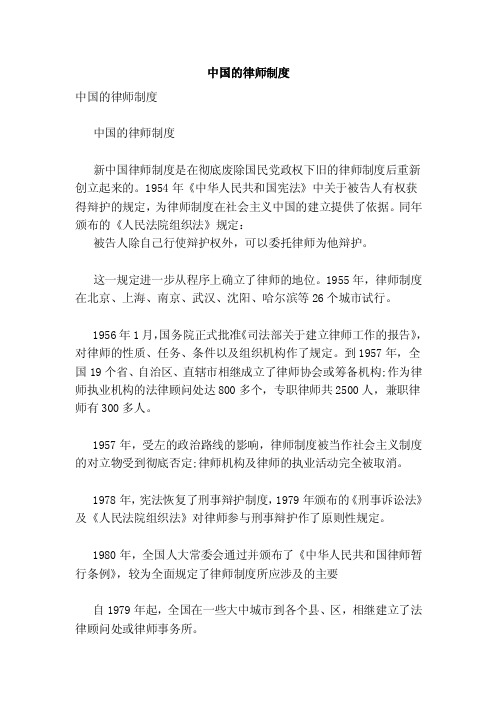
中国的律师制度中国的律师制度中国的律师制度新中国律师制度是在彻底废除国民党政权下旧的律师制度后重新创立起来的。
1954年《中华人民共和国宪法》中关于被告人有权获得辩护的规定,为律师制度在社会主义中国的建立提供了依据。
同年颁布的《人民法院组织法》规定:被告人除自己行使辩护权外,可以委托律师为他辩护。
这一规定进一步从程序上确立了律师的地位。
1955年,律师制度在北京、上海、南京、武汉、沈阳、哈尔滨等26个城市试行。
1956年1月,国务院正式批准《司法部关于建立律师工作的报告》,对律师的性质、任务、条件以及组织机构作了规定。
到1957年,全国19个省、自治区、直辖市相继成立了律师协会或筹备机构;作为律师执业机构的法律顾问处达800多个,专职律师共2500人,兼职律师有300多人。
1957年,受左的政治路线的影响,律师制度被当作社会主义制度的对立物受到彻底否定;律师机构及律师的执业活动完全被取消。
1978年,宪法恢复了刑事辩护制度,1979年颁布的《刑事诉讼法》及《人民法院组织法》对律师参与刑事辩护作了原则性规定。
1980年,全国人大常委会通过并颁布了《中华人民共和国律师暂行条例》,较为全面规定了律师制度所应涉及的主要自1979年起,全国在一些大中城市到各个县、区,相继建立了法律顾问处或律师事务所。
至80年代中期,律师执业机构已遍布全国各地;专职律师、兼职和特邀律师已具有一定规模;以刑事辩护为主导的律师的执业活动成为司法程序中的重要内容,律师制度在整体上得到全面恢复。
80年代中后期,中国律师制度开始了探索和改革的进程,不少律师事务所在司法行政机构及律师协会的支持下,以积极的姿态进行了富有创造性的改革尝试。
1993年,司法部根据我国社会主义市场经济建立和发展的要求,结合前期改革实践,提出并报经国务院批准了《关于深化律师工作改革的方案》,对中国律师的性质进行了重新界定,为中国律师制度适应市场经济的建立和发展创造了前提。
宋代讼师与英国中世纪律师对我国律师制度建设比较研究

宋代讼师与英国中世纪律师对我国律师制度建设的比较研究13世纪以前,欧洲的法律是没有太多值得中国学习的,包括这种所谓的”辩护人制度”。
为什么过了仅仅一个世纪,中华法系在英美法系面前显得迂腐不堪呢?笔者通过国家针对辩护人制度的两个法律规定来进行说明。
《宋刑统》第二十四卷《刑律》”为人作辞牒教令人告事”条规定:”诸为人作辞牒,加增其状,不如所告者,笞五十。
若加增罪重,减诬告一等。
即受雇诬告人罪者,与自诬告同;赃重者,坐赃论加二等;雇者从教令法。
若告得实,坐赃论,雇者不坐。
诸教人告,事虚应反坐,得实应赏者,皆以告者为首,教令为从。
即教令人告缌麻以上亲,及部曲、奴婢告主者,各减告者罪一等;被教者,讼如律。
若教人告子孙者,各减所告罪一等。
”伦敦城市法庭在1280年作了如下规定:禁止律师帮诉(即出钱或出力帮人诉讼,胜诉后分得利益),以阻止不必要的诉讼的增多;禁止两面获利,以防止腐败和律师背叛当事人;禁止辱骂对手,以维护法庭的正常诉讼秩序;禁止律师与法官坐在一起,以免影响法官的公正判决;禁止抨击法庭的判决,以维护法庭的尊严等等。
[1] 1注意律师的主体地位在”普天之下,莫非王土,率土之滨,莫非王臣”的思想支配下,整个国家都是君主个人的,凡是都是在君主权力的控制中。
这在控制讼师的法律上体现的很明显。
宋朝对于讼师有着严格的控制,并且严格禁止他们出现在审判的任何程序中。
非法的身份导致了司法实践中讼师的畸形发展,带来的后果主要是以下几个方面:(1)没有阳光的身份,讼师在参与案件时往往没有限制,无良的讼师没有任何忌讳,讼师无所不用其极。
(2)即使是有有良心的讼师,因为没有合法的身份,只能进行帮助当事人参与诉讼活动。
这种结构下只能加强中国传统的主审官”纠问式”职权主义传统。
不利于现代抗辩式的审判模式产生。
虽然反观英国的法律,而是通过法律确认律师在诉讼中的主体资格,并将律师代表当事人参与诉讼辩论变成了一个必经的法律程序。
政府为了保证律师的质量,建立了律师准入制度,给律师开办业务班学习法律知识及程序。
律师制度的起源与发展
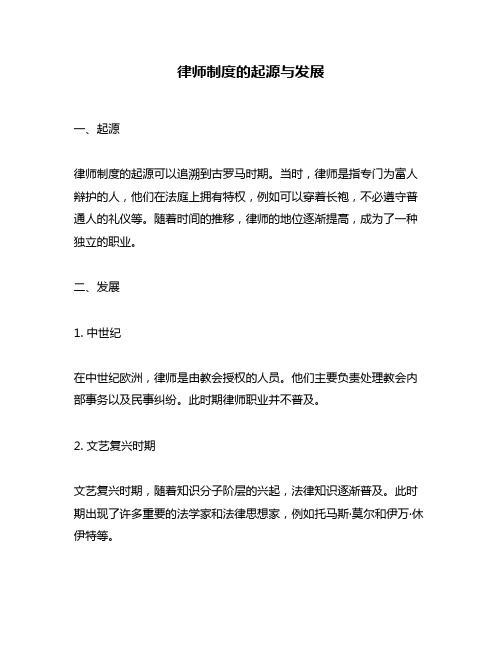
律师制度的起源与发展一、起源律师制度的起源可以追溯到古罗马时期。
当时,律师是指专门为富人辩护的人,他们在法庭上拥有特权,例如可以穿着长袍,不必遵守普通人的礼仪等。
随着时间的推移,律师的地位逐渐提高,成为了一种独立的职业。
二、发展1. 中世纪在中世纪欧洲,律师是由教会授权的人员。
他们主要负责处理教会内部事务以及民事纠纷。
此时期律师职业并不普及。
2. 文艺复兴时期文艺复兴时期,随着知识分子阶层的兴起,法律知识逐渐普及。
此时期出现了许多重要的法学家和法律思想家,例如托马斯·莫尔和伊万·休伊特等。
3. 近代近代律师制度主要起源于英国。
17世纪末期,在英国实行了普通法体系,并开始出现了专业化的律师团体。
18世纪初期,在英国成立了第一个正式的律师协会——伦敦律师公会。
4. 现代现代律师制度的发展主要与法治国家的建设有关。
随着法治思想的普及,律师作为法治的代表和维护者,其地位和作用得到了进一步提高。
目前,世界上大部分国家都已经建立了相应的律师制度。
三、律师制度的组成1. 律师协会律师协会是一个由律师自愿组成的专业性组织。
它旨在保护律师职业利益,提高律师素质和水平,并促进法治建设。
2. 律师事务所律师事务所是由一群律师组成的机构,提供各种法律服务。
它们可以是独立机构,也可以是与其他机构合作的分支机构。
3. 律师资格考试为了保证从业人员素质和水平,许多国家都规定了必须通过资格考试才能成为合格的律师。
考试内容通常包括法学理论知识、实际操作技能以及道德规范等方面。
四、中国的律师制度1. 历史中国的律师制度可以追溯到20世纪初期。
当时,中国开始引进西方法律体系,并成立了第一个律师机构——上海律师公会。
2. 现状目前,中国已经建立了较为完善的律师制度。
根据《中华人民共和国律师法》,中国的律师必须通过国家统一的司法考试,并注册成为执业律师才能从事相关工作。
3. 作用中国的律师在促进法治建设、保护公民权益、维护社会稳定等方面发挥着重要作用。
中国律师制度
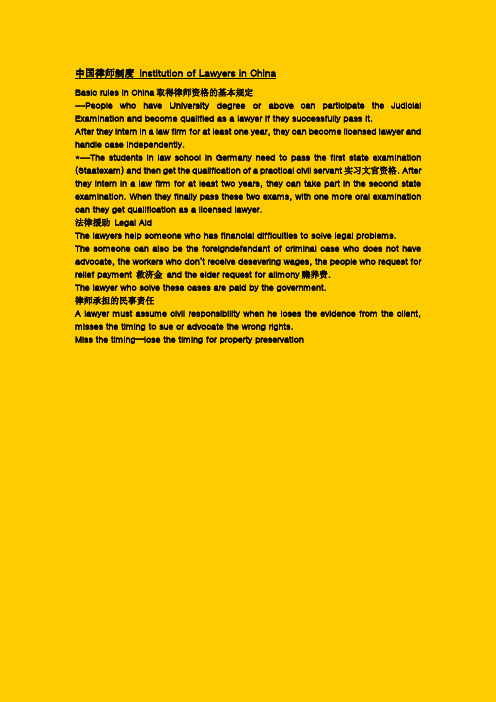
中国律师制度Institution of Lawyers in ChinaBasic rules in China取得律师资格的基本规定--People who have University degree or above can participate the Judicial Examination and become qualified as a lawyer if they successfully pass it.After they intern in a law firm for at least one year, they can become licensed lawyer and handle case independently.*--The students in law school in Germany need to pass the first state examination (Staatexam) and then get the qualification of a practical civil servant实习文官资格. After they intern in a law firm for at least two years, they can take part in the second state examination. When they finally pass these two exams, with one more oral examination can they get qualification as a licensed lawyer.法律援助Legal AidThe lawyers help someone who has financial difficulties to solve legal problems.The someone can also be the foreigndefendant of criminal case who does not have advocate, the workers who don’t receive d esevering wages, the people who request for relief payment 救济金and the elder request for alimony赡养费.The lawyer who solve these cases are paid by the government.律师承担的民事责任A lawyer must assume civil responsibility when he loses the evidence from the client, misses the timing to sue or advocate the wrong rights.Miss the timing—lose the timing for property preservation。
- 1、下载文档前请自行甄别文档内容的完整性,平台不提供额外的编辑、内容补充、找答案等附加服务。
- 2、"仅部分预览"的文档,不可在线预览部分如存在完整性等问题,可反馈申请退款(可完整预览的文档不适用该条件!)。
- 3、如文档侵犯您的权益,请联系客服反馈,我们会尽快为您处理(人工客服工作时间:9:00-18:30)。
中国的律师制度(英)Lawyer SystemThis system governs the nature, mission, organization, operational principles of lawyers, as well as how lawyers provide legal services.Nature, Mission and Status1. NatureArticle 2 of the Lawyers Law of the People's Republic of China, promulgated on May 15, xx, defines lawyers as "professionals who have obtained a practicing license through legal means to providelegal services." Lawyers are an important force for the construction of the legal system in China. Article 3 provides that practicing lawyers must abide by the Constitution and laws and adhere to the code of ethics and professional discipline for lawyers. They must use facts as basis and law as yardstick for practicing.2. MissionThe mission of lawyers is to achieve the objective specified in state laws through the practice of law. Article 1 of the Lawyers Law states that the mission of lawyers is to maintain the lawful rights and interests of the parties to a suit and maintain proper implementation of law. These two objectives are mutually complementary because the maintenance of lawful rights and interests is consistent with the maintenance of the right implementation of law.3. Status of LawyersChinese lawyers play an independent role in lawsuits. They do not belong to courts or procuratorates, nor do they belong to their clients. They participate in lawsuits in order to maintain the legal rights and interests of their clients. They are independent. They enjoy not only rights of an ordinary participant in a lawsuit, but also rights compatible with the exercise of the duties of a lawyer.Qualifications for LicensingTo practice, lawyers must first obtainprofessional qualifications and apply for a licenseafter probation. After obtaining qualifications, they must receive the license for practicing in accordance with legal procedures in order to practice law as a lawyer. Only then can they enjoy the rights of lawyers while assuming duties accordingly.Individuals who have obtained legal qualifications may retain their qualifications and not engage in the legal profession for a period of time. This is known as separation of legal qualifications from legal practicing.1. Legal QualificationsArticle 6 of the Lawyers Law provides that there are two ways for obtaining legal qualifications: through national examination or approval by judicial authorities.According to Article 6, "The state shall administer a national examination to determine lawyer qualification. Persons with a three-year college education in law and above or with equivalent qualifications, as well as persons with a bachelor's degree in other disciplines and above, can be awardedlawyer's qualifications by the State Council judicial administration after passing the national examination."Article 7 provides that persons with a four-year college education in law and above who have engaged in law studies and teaching and hold a senior professional title or with equivalent qualifications and who have applied for a practicing license may be granted lawyer's qualifications subject to approval by the State Council judicial authorities.2. Licensinga) Prerequisites for Applying for Practicing LicenseArticle 8 of the Lawyers Law states thatapplicants for a practicing license must support the Constitution of the People's Republic of China and meet the following requirements:Fully qualified;Full year of internship at a law firm;Be in good standing.b) Rejection of ApplicationsArticle 9 states that applicants who meet any of the following conditions will be denied a practicing license:Unable to perform civil acts or are restricted in performing civil acts;Have been criminally penalized (but not including crimes of negligence);Have been dismissed from public offices or hadtheir practicing license revoked.c) Procedures for ApplicationsApplicants must first submit, through theircurrent or future law firm, all the requiredapplication documents to the local judicial authorities. According to Article 10 of the Lawyers Law, these documents should include the following: Letter of application;Certificate of Lawyer Qualification;Internship Performance Evaluation by the law firm where the applicant has worked;Copies of the applicant's identification documents.The local judicial authorities should form an opinion within 15 days of receipt of the application documents and report the matter to the provincial (autonomous regional/municipal) judicial authorities. The judicial authorities of the provinces, municipalities and autonomous regions should, after reviewing the documents submitted, grant a practicing license to applicants who meet the requirements as specified in the Lawyers Law within 30 days of receipt of the application. Those who fail to meet the requirements will be denied a practicing license and should be notified of the decision in a written form within 30 days of receipt of the application.d) Registration of LicenseLawyers should register their practicing license once a year; unregistered licenses are not valid. Registration is administered by judicial authorities above the Judicial Bureau at the provincial(municipal or autonomous regional) level. If necessary, registration can also be administered by judicial bureaus at the prefectural (city or county)level with authorization from higher judicial authorities.3.Licensing RestrictionsArticle 12 of the Lawyers Law provides thatlawyers should practice at one law firm rather than at two or more simultaneously. No geographicalrestrictions should be imposed.Article 13 states that incumbent government office holders should not concurrently be lawyers. While serving on the Standing Committee of the People's Congress at various levels, lawyers should not practice.Article 14 provides that unlicensed persons should not practice as lawyers or represent or defend clients for a profit.Persons engaging in legal teaching and research should not be partners in a partnership or a cooperative law firm.Law FirmsArticle 15 of the Lawyers Law provides, "Alaw firm is the practicing institution of lawyers"and the basic unit for regulation of the legal profession. Practicing lawyers are dispatched by their law firms and they practice in the name of the law firms.1. Nature of Law FirmsThe Lawyers Law provides for three forms of law firms: state-funded, cooperative and partnership. Different operational mechanisms are permitted for different forms of law firms and they assume different legal obligations (civil liabilities).Article 16 states that state-funded law firms should practice law and assume liabilities with all their assets.Article 17 says that lawyers may form cooperative law firms and assume liabilities with all their assets.Article 18 says that lawyers may form partnership law firms and partners assume unlimited and joint liabilities for their firm.2. Establishment of a Law Firma) Article 15 provides that law firms should meet the following requirements:Have their own name, residence and articles of association;Have more than 100,000 RMB of assets;Have lawyers who meet requirements of this Law.b) Approval ProceduresArticle 19 states that applications for establishment of a law firm should be reviewed and verified by judicial authorities at the provincial (autonomous regional/municipal) level or above and a license should be issued to applicants who meet the requirements of this Law within 30 days of receipt of application; those who fail to meet the requirements should be denied a practicing license and be informed of the decision within 30 days of receipt of application.c) Establishment of Branch OfficesArticle 20 provides that law firms may set up branch offices subject to review and approval by local judicial authorities of the province (autonomous region/municipality) where the branch office is to beset up. The parent law firm should assume liabilities for their branch offices.d) Alteration and Termination of Law FirmsArticle 21 states that law firms should report any alteration of name, location, articles of association and partnership or dissolution to the original approval authorities.3. Internal ManagementArticle 23 states that lawyers should undertake business through their law firm, which should sign a written contract with their clients, charge them fees in compliance with state regulations, and record the fees faithfully into books.Article 24 states that law firms and lawyers should not engage in acts of unfair competition such as defaming other lawyers or paying commissions on referrals.4. Transformation of Law FirmsLaw firms are undergoing reforms aimed at severing any links with government departments. According to a State Council notice [Guofaban xx No. 51] on theseparation of intermediary organizations engaged in economic certification from government departments and a Ministry of Justice notice on the separation of law firms and legal counseling institutions from government offices, the following types of law firms should sever their links with the government: State-funded law firms that have already achieved a balance of payments;Law firms affiliated with non-profit institutions, enterprises or social organizations;Legal counseling service providers establishedwith approval of judicial authorities and affiliated with government offices, non-profit institutions, enterprises or social organizations.After severing ties with government offices, these law firms should be transformed into partnership or cooperative law firms no longer affiliated with administrative or institutional entities. They will no longer enjoy privileges associated with ranking government offices. State-funded law firms that have not yet realized a balance of payments and which arestill dependent upon state subsidies will not participate in the separation program.This program was completed before October 31, xx.The definition and disposal of state assets were based on the principle of “whoever invests owns the property.” While ensuring the integrity of state assets, the policy takes into account assets formed by legal professionals with their intellectual work.Business, Rights and Duties of Practicing Lawyers1. BusinessArticle 25 of the Lawyers Law provides that lawyers may engage in the following businesses: Be legal counsels at the request of citizens,legal entities and other organizations;Represent clients and participate in lawsuits at the request of parties to civil and administrative cases;Provide legal counseling at the request ofcriminal suspects and file complaints, lawsuits or applications for obtaining a guarantor while awaiting trial on behalf of clients; act as defense attorney atthe request of the suspect, the accused or the court; act as the advocate and participate in lawsuits at the request of private prosecutors, victims or their next-of-kin relatives in public-prosecution cases;File complaints on behalf of clients;Participate in mediation and arbitration at the request of clients;Provide legal services at the request of clients who are not parties to a lawsuit; andProvide legal counseling, draft lawsuit documents and other legal documents.2. Rights and Obligations of LawyersAccording to the Lawyers Law, the Criminal Procedure Law, the Civil Procedure Law, the Administrative Procedure Law and other regulatory interpretations, lawyers enjoy the following rights and assume the following obligations.a) RightsInvestigation. Article 31 of Lawyers Law provides that when handling legal cases, lawyers, subject topermission by relevant entities or individuals, investigate them for fact-finding purposes.Access to documents and files. The Criminal Procedure Law provides that the defense attorney may, from the day the procuratorate reviews a lawsuit, access, transcribe or copy judicial documents and technical appraisement documents of the case; they may also, from the day the court handles the case, access, transcribe or copy factual documents used in the case. Article 30 of the Lawyers Law provides that lawyers participating in lawsuits may, in compliance with procedural law, access documents related to the case.Meet and communicate with persons with limited personal freedoms.Appear in court and participate in lawsuits.Refuse to defend and represent any client.Lawyers' corporal rights are inviolable.b) ObligationsAbide by the Constitution and laws and observe codes of ethics and professional discipline;Defend and represent clients unless circumstances require otherwise;Provide legal aid;Maintain confidentiality. Article 33 of the Lawyers Law states that lawyers should maintain state secrets and commercial secrets known to them in the practice of law and they should not reveal the privacy of their clients;Refrain from accepting special cases. Article 34of the Lawyers Law states that lawyers should represent both parties to a dispute at the same time. Article 36 provides that lawyers who have served as judges and prosecutors should not represent or defend clients within two years of retirement from the court or procuratorate;Refrain from representing clients in private;Refrain from profiting from parties to a dispute by taking advantage of the convenience of legal service or accept money or gifts from clients;Refrain from meeting judges and prosecutors in violation of rules;Refrain from giving gifts to or bribe judges, prosecutors, arbiters and other related personnel, or prompting or instigating their clients to bribe;Refrain from hampering testimony giving. Article35 of the Lawyers Law provides that lawyers should not engage in perjury, hide facts or threaten or prompt others to commit perjury, hide facts or interfere in the legal collection of evidence by the other party;Refrain from disturbing the order of a court oflaw or an arbitration tribunal.Bar Associations1. Nature of Bar AssociationsClause 1, Article 37 of the Lawyers Law states,"Bar associations are non-governmental organizations enjoying the status of legal entities. They are the self-disciplinary bodies of lawyers."Status of bar associations: Judicial authorities instruct and supervise bar associations.2. Setup of Bar AssociationsClause 2, Article 37 states that a China National Bar Association will be established at the nationallevel and local bar associations set up at provincial (autonomous regional/municipal) levels. Cities with different districts may set up local bar associations if necessary.3. Relations Between Bar Associations and LawyersClause 2, Article 39 provides that lawyers must join a local bar association. Lawyers who are members of a local bar association are also members of the national bar association. In accordance with the constitution of the bar association, members enjoy rights and perform duties accordingly.4. Responsibilities of Bar AssociationsArticle 40 of the Lawyers Law states that bar associations should perform the following duties: Ensure legal practicing for lawyers and safeguard their lawful rights and interests;Summarize and exchange experiences among lawyers;Organize legal training programs;Publicize, inspect and supervise lawyers' code of ethics and professional discipline;Organize lawyers to undertake international exchanges;Arbitrate disputes arising from the practice of law;Other duties as specified in law.Bar associations should reward or penalize lawyers in accordance with their constitution or bylaws.Code of Ethics, Professional Discipline and Penalties for Lawyers1. Code of EthicsAccording to the Code of Ethics and Professional Discipline for Lawyers adopted on October 6, xx by the China National Bar Association, lawyers should: Always be client-oriented;Be faithful to their code of ethics, safeguard the legality of the state and social justice;Be honest and trustworthy, providing legal assistance to clients dutifully;Respect each other and compete fairly;Be clean and maintain self-discipline;Be loyal to the legal profession and maintain the reputation of lawyers.2. Professional DisciplineThe above-mentioned Code of xx imposes the following disciplines on lawyers:Disciplines at the workplace: lawyers should not charge fees exorbitantly;Disciplines during action and arbitration;Disciplines governing lawyers' relations with their clients and the defendant;Disciplines governing relations among lawyers themselves.3. Penalties for LawyersThe Ministry of Justice on October 22, xx published penalties for lawyers who breach their code of ethics and professional discipline.a) Main provisions on penalties:Warning;Suspension of business;Disqualification of lawyers.b) Enforcement body and proceduresJudicial authorities above prefecture, city and county level should be the enforcement body. Legal disciplinary committees should be established within those judicial authorities to enforce penalties. Members of the committee should include practicing lawyers, lawyers' associations and judicial personnel.Procedures for enforcing penalties:Submission and review of proposal to mete out penalty;Appraisal of the penalty measure;Review;Enforcement of penalty.。
